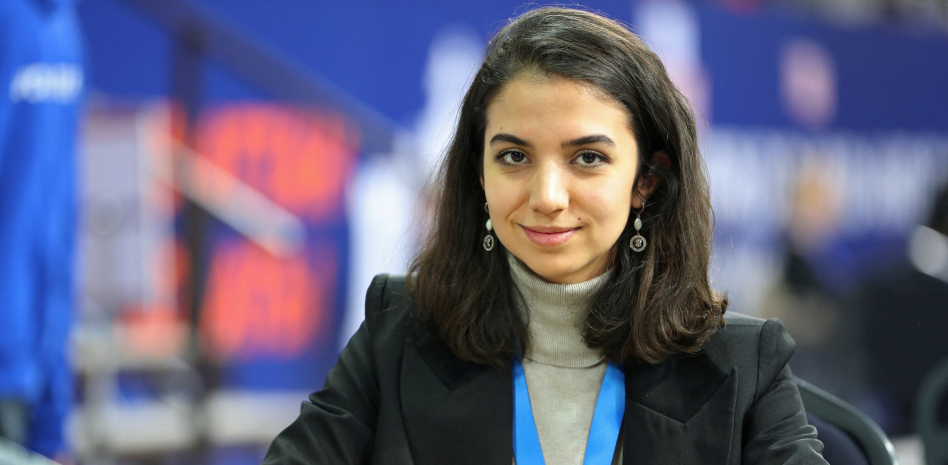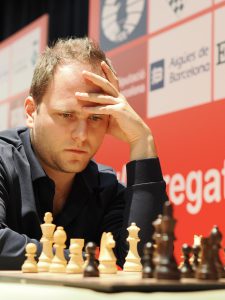I am 26 years old: in chess all ages are good. I was born in Tehran: more and more beautiful because more and more people are fighting to make it freer. Married to filmmaker Ardeshir Ahmadi: we have a two-year-old son. I compete tomorrow in the Llobregat Open Chess Tournament with masters from 44 countries. (Photo: Pavel Mikheyev / Reuters) (Originally published on: https://www.lavanguardia.com/lacontra/20231129/9413966/dia-senti-llevaba-velo-me-quite.html)
The board has no sex
Her family still lives in Tehran, so Sara Khadem cannot be completely sincere when talking about Iran; but she is unabashed when she pronounces herself about women in chess: they should play in the same category as men. Against those who defend segregating them, “because they have different brains,” she argues that what makes them different is what is imbued in their brains from an early age: “It is still as strange to give a board to a three-year-old girl as a doll to a boy,” she reasons, “as it is to give a doll to a boy. And if there are fewer elite players than players, it’s only because there are also fewer players in total. I always choose to play in Open -against men and women- because by confining us to the women’s category we are incentivized to settle in and not try harder. If we compete with them all the time, we will end up winning like them all the time”.
What was your childhood in Iran like?
My father was a computer engineer and my mother was a housewife. My father had studied in Germany so we were a happy family open to the world.
Aren’t you afraid that your parents will suffer retaliation for your escape?
You can’t live with paranoia. It would be a non-living. So I worry about them, but I don’t obsess about them.
Was your father a good chess player?
He does not know how to play chess.
How did you learn?
I had learning difficulties as a child in school. I was having trouble concentrating.
Today she is the Spanish chess champion and the 15th best player in the world.
But as a child I made silly mistakes due to lack of concentration, so my mother talked to another mother who had her son learning chess and he was doing very well in school and they put me to play with him when I was 7 years old.
I see you liked it.
I was passionate about it. If my teacher gave me two pages of chess problems, I asked for four. And I started winning tournaments very fast until the final of the national children’s championship and I was champion of Iran.
Congratulations.
But what really made me famous in my country was winning the Asian championship. Meanwhile, I was getting good grades.
Did they recognize you on the street?
Iran does not win many sports championships in the world….
No, not really.
…So when we won one, people really celebrated it, so I became really popular really fast and I considered becoming a professional player.
As a teenager going to private parties in Tehran? They say they are great.
In Iran everything is possible as long as you don’t do it publicly. But sometimes a neighbor calls the morality police…And you get in trouble. Before that, at the age of 12, I won my first world championship and stayed in school until high school, when I decided to become a professional chess player.
Is drinking a beer there a crime?
And if you are a girl and you don’t wear the veil and on top of that you are with boys, it becomes a crime that they punish severely.
Were you resigned or did you infringe?
For me it was different, because I was lucky that I was traveling around the world with the Iranian chess team.
How difficult is it for the authorities to let an Iranian leave the country?
Getting a visa is very difficult. I was very fortunate to play around the world and have an open family.
Why isn’t Iran becoming more flexible like other totalitarian regimes?
When the revolution broke out, those who wanted it to be the way it is won. But it was not a particularly religious country before. This is a complex issue that we cannot resolve now.
Will the dictatorial regime last?
It is obvious that most Iranians are not happy with the current situation….
Until one day you said enough was enough in a championship… And you took off your veil!
Before I decided I had already traveled a lot with boys and girls from the team, even though a policeman was always watching us and sending reports if we took off the veil or if we went too far publicly in anything….
Were they punished?
Girls were punished more: to their faults was added that of not wearing the veil. We learned to always behave in two ways: secretly and publicly.
When did you meet your husband?
I was 19 and we got married at 21. As he was an Iranian filmmaker educated in Canada he also had an open mind and we traveled for six months and spent another six months in Iran until I made some statements on behalf of my teammate, Alireza Firouzja, who had fled to France, one of the best players in the world….
Did it cost you dearly to show solidarity with him?
My passport was temporarily taken away; I left the Iranian team; the pandemic came; then I became a mother; and then came the championship in Almaty to which we all went expectantly because of the anti-veil revolt in Iran: were you for it – we asked – or not? Not speaking out was to accept the veil.
What did you do?
I wrote against the veil on the networks and I got a call from the police. And the day came when I told myself that with the veil I was not me. That woman I saw in the veiled photos or in the mirror was not me. And at the Almaty Tournament, while protests were going on in Iran, I took it off.
And did you know that you would not return to Iran?
I knew it, that’s why I went into exile in Spain and last July I stopped being an exile and became a Spaniard.




















